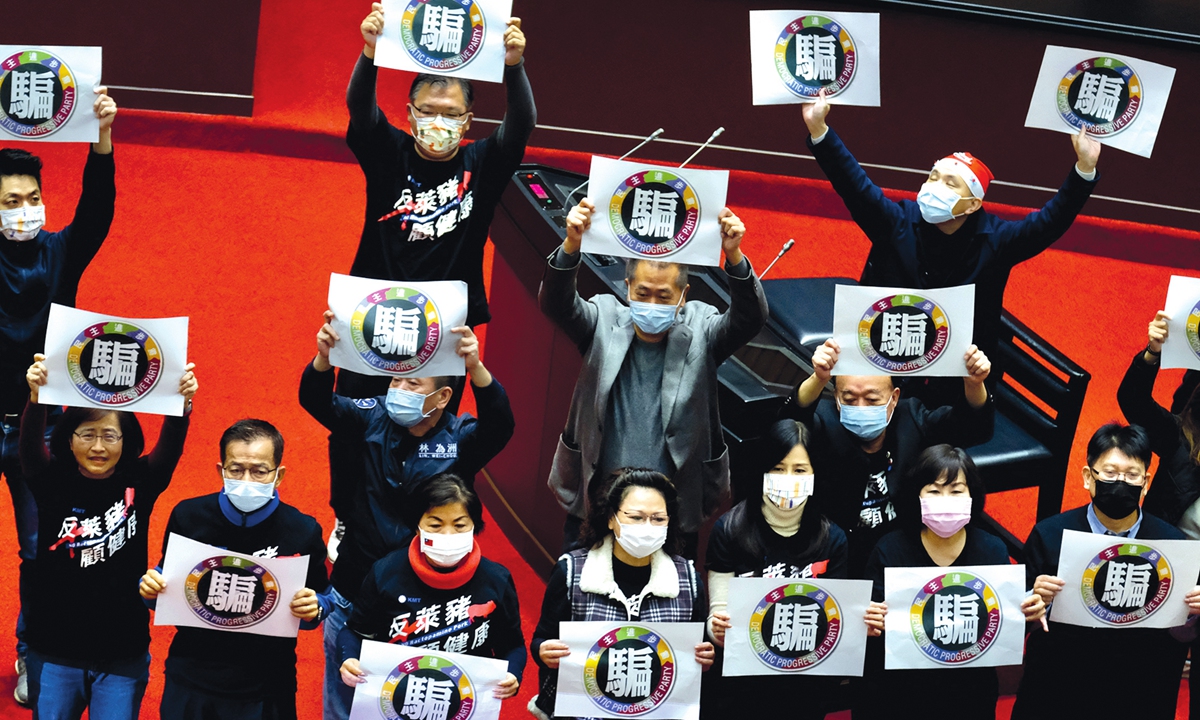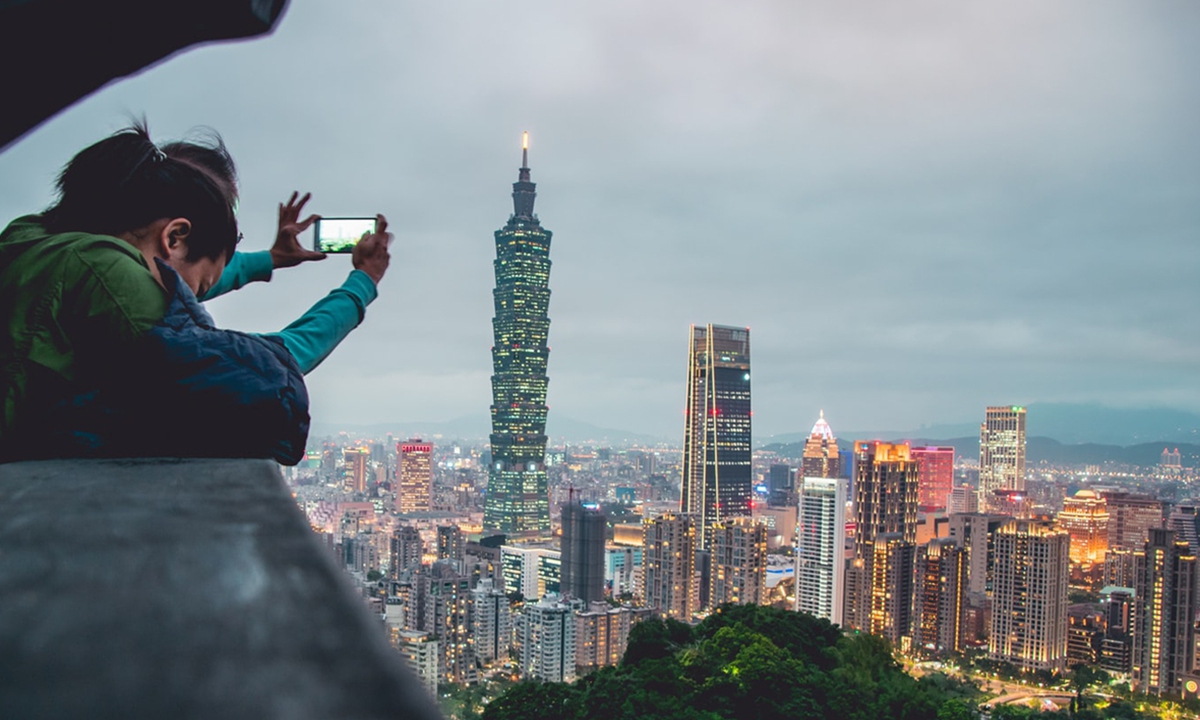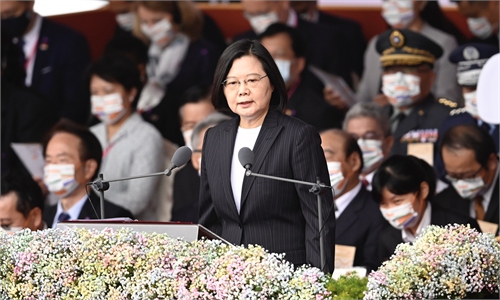Taiwan DPP's dark "online army" underbelly in misinformation campaign
Invisible Hand
"Taiwan's import of problematic US pork"; "Taiwan's hype over mainland 'pineapple ban'"; "A referendum for Taiwan's Cherish Algal Reefs" - These topics, which have recently aroused heated discussion on the island of Taiwan, have been the battleground between the Kuomintang-led blue camp and the Democratic Progressive Party (DPP)-led green camp. However, there seems to be an invisible "hand" behind these hot discussions - the DPP's "online army."
At the beginning of the COVID-19 pandemic, the infamous "online army" masterminded an attack against the World Health Organization (WHO), labeling the coronavirus the "Wuhan virus" and terming it as "chemical and biological weapons" amid iterations of their similar frivolous accusations. Behind these rumors is the DPP's "online army" which manipulated and meddled in an online public opinion field of more than 20 million people on the island.
The Global Times probed the "online army" group's tools and tricks in controlling public opinion online, and it found out that the departments affiliated to the DPP administration and relevant foundations are the financial supporters and "base camp" for these online "army" forces.

'Industrialized' rumors production line
This so-called "online army" serves the specific political interest groups by calculatingly organizing political attacks or defenses, gathering intelligence, or manipulating online public opinion, Hou Han-ting, Taiwan commentator on political matters, and Taipei city councilor of the New Party, told the Global Times, noting that the DPP and its affiliations are all good at using the "online army."
In Taiwan, the "online army," also known as "1450" comes from the DPP government's plan to allocate NT$14.5 million in 2019 to employ a small number of editors to "correct" information on the internet. The practice was accused of taking taxpayers' money to support the online army to clarify information deemed unfavorable to the DPP. From then on, "1450" became the code name of the DPP's "online army," media reported. Many people questioned whether any news that was not conducive to the DPP authorities would be classified as "false news."
Hou Han-ting described to the Global Times the general operation process of the "online army." First, under the order of directing online public opinion on certain agendas (such as an attack on the KMT), the graphic teams quickly design relevant images and memes, and then the team asks their affiliated forums, such as the PTT Bulletin Board System, DCARD, IG, and some influential figures who are DPP's supporters to repost the content. Then, their affiliated media swoops in to intensify the hyping of the designed material, with a large number of suspected robot accounts to repost or comment. Next, some political figures enter the fray to quickly and extensively repost and spread these news buzz pieces.
But DPP's manipulative measures go far beyond that. "The DPP can collude with social media such as PTT, Facebook, print media, electronic media, and TV programs," Hou explained.
"The DPP's 'online army' is easy to identify," Han Guo Ren, a web celebrity from Taiwan, who is familiar with the ecology of public opinion on the island, summed up two characteristics of the online army.
"First, it distorted facts and fomented fear, and hatred against the mainland. For example, it equated the '1992 Consensus' with 'one country, two systems' and fabricated the 'mainland's pineapple ban' as a result of 'Kuomintang's technology leak that helps the mainland develop its own cultivation technology'. Some people in Taiwan who have no clear discernment would believe it," Han Guo Ren said.
Another obvious characteristic is to "recruit" or "appeal" to opinion leaders and carry out a unified public opinion offensive against their political rivals. Han Guo Ren recalls that before the 2020 elections in Taiwan, a number of "strange Facebook fan pages" sprung up to spread sensational information.
"Some web celebrities who had previously been politically aloof, or neutral or even pro-blue camp, suddenly began to forward these messages, attacking then opposition candidate Han Kuo-yu or whitewashing what the DPP had done wrong. What's more, some hosts of children's programs have begun to speak out in favor of the green camp. At the same time, many institutes collecting public opinion anticipated that Han Kuo-yu was going to lose the election."
Li Baiyang, an expert from Wuhan University in Hubei Province told the Global Times that the DPP's online army's manipulation of public opinion usually has four main themes: Attacking rivals such as the Kuomintang; indoctrinating separatists ideas; discrediting the mainland, and portraying itself as a subject "being suppressed"; creating trouble or interfering in the internal affairs of other countries.

Tentacles throughout the island
In 2018, The Reporter website, a local Taiwan website published an article titled "Who Leads the Way: The Money-Manipulated War on Public Opinion," revealing the specific operation process of the DPP employing marketing companies to manipulate public opinion.
In the report, Kevin (pseudonym), a senior project manager in a marketing company for more than 10 years, pointed out his clients are usually a constellation of peripheral organizations affiliated with "a political party," which often spend hundreds of thousands of new Taiwan dollars to hire internet marketers.
Kevin noted that during the negotiation, these party outfits would demand that every bit of financial inflow generated with them "must be carefully cut" and utilized at arm's length to protect contributors from any risk of disclosure.
Taiwan's political parties and authorities have destroyed all the clues which may point them to manipulating public opinion, which not only facilitated the exclusion of negative voices but also allowed them to further make good use of this power, the Reporter concluded.
Observers claimed that the peripheral organizations of the DPP are the "source" of this campaign and that the DPP administration's "information warfare" rollout is now in full swing at the political party's administrative and military levels.
In May 2020, the DPP established the "Center for Online Communities," with Tsai Ing-wen's re-election campaign office spokesperson as its director. In November 2020, a bureaucrat from the "executive authority" of Taiwan was even revealed by local media to have been making online publicity pictures during office hours at the conference site.
The Global Times discovered that the concept of the "Online army" is very popular in Taiwan's "defense authority." As early as 2015, the DPP "think tank" New Frontier Foundation issued a report calling for the immediate enhancement of Taiwan's information warfare capabilities and the establishment of an independent "fourth military service" for integrating the information and communications of Taiwan's armed forces.
Han Guo Ren told the Global Times that the DPP may have multiple "control hubs" for their online armies, as the DPP-backed associations such as New Frontier Foundation, and the Thinking Taiwan Foundation, have spent a lot of money and effort into this project.
"It may be understood that the DPP is a flag, those peripheral political parties and foundations only need to follow the commands to gain benefits," Han Guo Ren said, adding that the funding for manipulating public opinion may come from the DPP's party funds, the support from "Taiwan independence" organizations, and foreign anti-China forces, or even from the DPP's misappropriation of public funds.
Ghostly 'private hitmen'
In 2019, Tsai's political contributions reached NT$ 560 million ($19.58 million), of which the largest expenditure item was "social network consultancy fees and Line's (an instant messaging platform) social system interactive technical services." The project amount is NT$7.5 million ($0.26 million), and the expenditure is for OakMega, a marketing company that provides "Customer Relationship Management" (CRM) for its clients on social-networking platforms.
The Global Times found that OakMega was founded in 2017, advertising that it "provides one-stop CRM solutions on messaging apps, empowering institutions to build close relationships with customers easily." However, their official website does not disclose any further information about the company's business.
Such cases are not uncommon on the island of Taiwan. Chiu Yi, a Taiwan-based expert on the cross-Straits relations, and a TV commentator told the Global Times in a previous interview that just like ghosts, the PR and marketing firms that worked for the DPP seemed to be full of secrets, sharing little information, and serving the party for a short period.
For example, a marketing company called "Fan Gong", which received NT$27.84 million ($0.97 million) of election funding from Tsai was set up during the Taiwan regional leader election campaign and dissolved immediately after the election.
Han Guo Ren revealed that he had some friends who worked in Taiwan's online marketing companies, where the DPP's orders were obviously exponentially more than the KMT's, and compared to KMT which was always underfunded in comparison, DPP was also more generous.
"The DPP was founded based on media and is by nature good at manipulating 'public opinion'," Li remarked, adding that the DPP's early tactics of swaying public opinion mainly served the purposes of the party election, but after Tsai took office, it began to build a cyber force gradually dedicated to serving to Tsai's own benefit.
"This force has now grown to take full control of Taiwan's media channels, creating frequent online incidents and making the 'online army' Tsai's private hitmen," Li said.
At the beginning of the COVID-19 pandemic, the infamous "online army" masterminded an attack against the World Health Organization (WHO), labeling the coronavirus the "Wuhan virus" and terming it as "chemical and biological weapons" amid iterations of their similar frivolous accusations. Behind these rumors is the DPP's "online army" which manipulated and meddled in an online public opinion field of more than 20 million people on the island.
The Global Times probed the "online army" group's tools and tricks in controlling public opinion online, and it found out that the departments affiliated to the DPP administration and relevant foundations are the financial supporters and "base camp" for these online "army" forces.

Lawmakers from the Kuomintang party display placards reading "lie" during a demonstration against Tsai Ing-wen lifting restrictions on US pork in Taipei on December 24, 2020. Photo: AFP
'Industrialized' rumors production line
This so-called "online army" serves the specific political interest groups by calculatingly organizing political attacks or defenses, gathering intelligence, or manipulating online public opinion, Hou Han-ting, Taiwan commentator on political matters, and Taipei city councilor of the New Party, told the Global Times, noting that the DPP and its affiliations are all good at using the "online army."
In Taiwan, the "online army," also known as "1450" comes from the DPP government's plan to allocate NT$14.5 million in 2019 to employ a small number of editors to "correct" information on the internet. The practice was accused of taking taxpayers' money to support the online army to clarify information deemed unfavorable to the DPP. From then on, "1450" became the code name of the DPP's "online army," media reported. Many people questioned whether any news that was not conducive to the DPP authorities would be classified as "false news."
Hou Han-ting described to the Global Times the general operation process of the "online army." First, under the order of directing online public opinion on certain agendas (such as an attack on the KMT), the graphic teams quickly design relevant images and memes, and then the team asks their affiliated forums, such as the PTT Bulletin Board System, DCARD, IG, and some influential figures who are DPP's supporters to repost the content. Then, their affiliated media swoops in to intensify the hyping of the designed material, with a large number of suspected robot accounts to repost or comment. Next, some political figures enter the fray to quickly and extensively repost and spread these news buzz pieces.
But DPP's manipulative measures go far beyond that. "The DPP can collude with social media such as PTT, Facebook, print media, electronic media, and TV programs," Hou explained.
"The DPP's 'online army' is easy to identify," Han Guo Ren, a web celebrity from Taiwan, who is familiar with the ecology of public opinion on the island, summed up two characteristics of the online army.
"First, it distorted facts and fomented fear, and hatred against the mainland. For example, it equated the '1992 Consensus' with 'one country, two systems' and fabricated the 'mainland's pineapple ban' as a result of 'Kuomintang's technology leak that helps the mainland develop its own cultivation technology'. Some people in Taiwan who have no clear discernment would believe it," Han Guo Ren said.
Another obvious characteristic is to "recruit" or "appeal" to opinion leaders and carry out a unified public opinion offensive against their political rivals. Han Guo Ren recalls that before the 2020 elections in Taiwan, a number of "strange Facebook fan pages" sprung up to spread sensational information.
"Some web celebrities who had previously been politically aloof, or neutral or even pro-blue camp, suddenly began to forward these messages, attacking then opposition candidate Han Kuo-yu or whitewashing what the DPP had done wrong. What's more, some hosts of children's programs have begun to speak out in favor of the green camp. At the same time, many institutes collecting public opinion anticipated that Han Kuo-yu was going to lose the election."
Li Baiyang, an expert from Wuhan University in Hubei Province told the Global Times that the DPP's online army's manipulation of public opinion usually has four main themes: Attacking rivals such as the Kuomintang; indoctrinating separatists ideas; discrediting the mainland, and portraying itself as a subject "being suppressed"; creating trouble or interfering in the internal affairs of other countries.

Taiwan Photo: Unsplash
Tentacles throughout the island
In 2018, The Reporter website, a local Taiwan website published an article titled "Who Leads the Way: The Money-Manipulated War on Public Opinion," revealing the specific operation process of the DPP employing marketing companies to manipulate public opinion.
In the report, Kevin (pseudonym), a senior project manager in a marketing company for more than 10 years, pointed out his clients are usually a constellation of peripheral organizations affiliated with "a political party," which often spend hundreds of thousands of new Taiwan dollars to hire internet marketers.
Kevin noted that during the negotiation, these party outfits would demand that every bit of financial inflow generated with them "must be carefully cut" and utilized at arm's length to protect contributors from any risk of disclosure.
Taiwan's political parties and authorities have destroyed all the clues which may point them to manipulating public opinion, which not only facilitated the exclusion of negative voices but also allowed them to further make good use of this power, the Reporter concluded.
Observers claimed that the peripheral organizations of the DPP are the "source" of this campaign and that the DPP administration's "information warfare" rollout is now in full swing at the political party's administrative and military levels.
In May 2020, the DPP established the "Center for Online Communities," with Tsai Ing-wen's re-election campaign office spokesperson as its director. In November 2020, a bureaucrat from the "executive authority" of Taiwan was even revealed by local media to have been making online publicity pictures during office hours at the conference site.
The Global Times discovered that the concept of the "Online army" is very popular in Taiwan's "defense authority." As early as 2015, the DPP "think tank" New Frontier Foundation issued a report calling for the immediate enhancement of Taiwan's information warfare capabilities and the establishment of an independent "fourth military service" for integrating the information and communications of Taiwan's armed forces.
Han Guo Ren told the Global Times that the DPP may have multiple "control hubs" for their online armies, as the DPP-backed associations such as New Frontier Foundation, and the Thinking Taiwan Foundation, have spent a lot of money and effort into this project.
"It may be understood that the DPP is a flag, those peripheral political parties and foundations only need to follow the commands to gain benefits," Han Guo Ren said, adding that the funding for manipulating public opinion may come from the DPP's party funds, the support from "Taiwan independence" organizations, and foreign anti-China forces, or even from the DPP's misappropriation of public funds.
Ghostly 'private hitmen'
In 2019, Tsai's political contributions reached NT$ 560 million ($19.58 million), of which the largest expenditure item was "social network consultancy fees and Line's (an instant messaging platform) social system interactive technical services." The project amount is NT$7.5 million ($0.26 million), and the expenditure is for OakMega, a marketing company that provides "Customer Relationship Management" (CRM) for its clients on social-networking platforms.
The Global Times found that OakMega was founded in 2017, advertising that it "provides one-stop CRM solutions on messaging apps, empowering institutions to build close relationships with customers easily." However, their official website does not disclose any further information about the company's business.
Such cases are not uncommon on the island of Taiwan. Chiu Yi, a Taiwan-based expert on the cross-Straits relations, and a TV commentator told the Global Times in a previous interview that just like ghosts, the PR and marketing firms that worked for the DPP seemed to be full of secrets, sharing little information, and serving the party for a short period.
For example, a marketing company called "Fan Gong", which received NT$27.84 million ($0.97 million) of election funding from Tsai was set up during the Taiwan regional leader election campaign and dissolved immediately after the election.
Han Guo Ren revealed that he had some friends who worked in Taiwan's online marketing companies, where the DPP's orders were obviously exponentially more than the KMT's, and compared to KMT which was always underfunded in comparison, DPP was also more generous.
"The DPP was founded based on media and is by nature good at manipulating 'public opinion'," Li remarked, adding that the DPP's early tactics of swaying public opinion mainly served the purposes of the party election, but after Tsai took office, it began to build a cyber force gradually dedicated to serving to Tsai's own benefit.
"This force has now grown to take full control of Taiwan's media channels, creating frequent online incidents and making the 'online army' Tsai's private hitmen," Li said.



